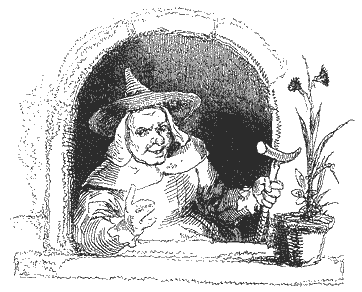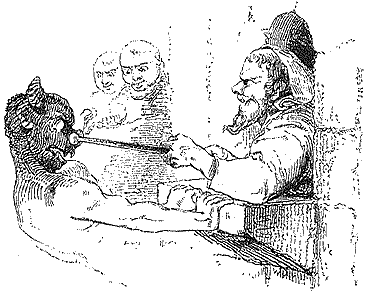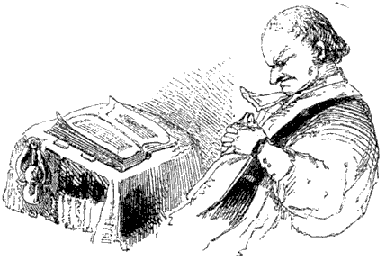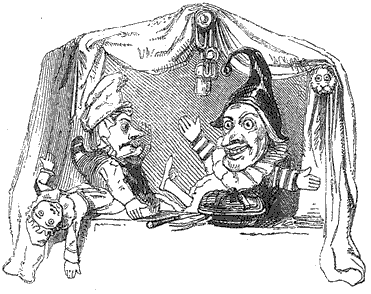

|
|
|
BESSY BELL and Mary Gray, They were two bonny lasses : They built their house upon the lea, And covered it with rashes.[lit.]
Bessy kept the garden gate,
|
/ p.18 /
|
THERE was a lady all skin and bone, Sure such a lady was never known : This lady went to church one day, She went to church all for to pray.
And when she came to the church stile,
When she came to the church door,
On looking up, on looking down,
Then she unto the parson said, |
|
------------------ * This line, slightly altered, has been adopted in Lewis's ballad of "Alonzo the brave and fair Imogine." The version given above was obtained from Lincolnshire, and differs slightly from the one in 'Gammer Gurton's Garland,' 8vo, Lond. 1810, pp.29-30.
|
/ p.19 /
|
OLD Boniface he loved good cheer, And took his glass of Burton, And when the nights grew sultry hot, He slept without a shirt on.
|
|
|
|
TAFFY was a Welshman, Taffy was a thief ; Taffy came to my house and stole a piece of beef : I went to Taffy's house, Taffy was not at home ; Taffy came to my house and stole a marrow-bone.
I went to Taffy's house, Taffy was not in ;
|
| [The tale of Jack Horner has long been appropriated to the nursery. The four lines which follow are the traditional ones, and they form part of 'The pleasant History of Jack Horner, containing his witty Tricks and pleasant Pranks, which he plaied from his Youth to his riper Years,' 12mo ; a copy of which is in the Bodleian Library, and this extended story is in substance the same with 'The Fryer and the Boy,' 12mo, Lond. 1617, and both of them are taken from the more ancient story of 'Jack and his step-dame,' which has been printed by Mr. Wright.] |
|
LITTLE Jack Horner sat in the corner, Eating a Christmas pie : He put in his thumb, and he took out a plum, And said, "What a good boy am I !"
|
/ p.20 /
| [As related by an old nurse, aged eighty-one. The story is of oriental origin ; but the song, as recited, was so very imperfect, that a few necessary additions and alterations have been made.] |
|
THERE once was a gentleman grand, Who lived at his country seat ; He wanted an heir to his land, For he'd nothing but daughters yet.
His lady's again in the way,
The gentleman answered gruff,
The lady at this declaration,
She sent her away to be nurs'd, |
|
Fifteen summers are fled, Now she left good Mrs. Jervis ; To see home she was forbid,— She determined to go and seek service.
Her dresses so grand and so gay,
She knock'd at a castle gate,
My lady look'd long in her face,
So Catskin was under the cook,
There is now a grand ball to be, |
|
"You go with your Catskin robe, You dirty impudent slut ! Among the fine ladies and lords, A very fine figure you'd cut."
A basin of water she took,
She washed every stain from her skin,
When she entered, the ladies were mute,
He pray'd her his partner to be,
"Pray tell me, fair maid, where you live ?"
|
|
Then she flew from the ball-room, and put On her Catskin robe again ; And slipt in unseen by the cook, Who little thought where she had been.
The young lord, the very next day,
There's another grand ball to be,
"You go with your Catskin robe,
In a rage the ladle she took,
She washed every blood-stain off |
|
My lord, at the ball-room door, Was waiting with pleasure and pain ; He longed to see nothing so much As the beautiful Catskin again.
When he asked her to dance, she again
"Pray tell me," said he, "where you live ?"
Then she flew from the ball, and put on Her Catskin robe again ; And slipt in unseen by the cook, Who little thought where she had been.
My lord did again, the next day,
Now another grand ball is to be, |
|
"You go with your Catskin robe, You impudent, dirty slut ! Among the fine ladies and lords, A very fine figure you'd cut."
In a fury she took the skimmer,
She washed the stains of blood
My lord, at the ball-room door,
When he asked her to dance, she again
"Pray tell me, fair maid, where you live ?"
|
|
Then she flew from the ball, and threw on Her Catskin cloak again ; And slipt in unseen by the cook, Who little thought where she had been.
But not by my lord unseen, —
Next day he took to his bed,
He told him how dearly he lov'd her,
There's a struggle of pride and love,
Then my lord got quickly well, |
|
To a wayfaring woman and child, Lady Catskin one day sent an alms ; The nurse did the errand, and carried The sweet little lord in her arms.
The child gave the alms to the child,
This throw went to Catskin's heart,
They set out in my lord's own coach ;
They put up at the head inn,
When folks are away, in short time |
|
Her father repented too late, And the loss of his youngest bemoan'd, In his old and childless state, He his pride and cruelty own'd.
The old gentleman sat by the fire,
But my lord drew a chair close by,
The old man alarm'd, cried aloud,
Then my lord brought his wife and child
The bells, ringing up in the tower,
|
/ p.29 /
|
ST. DUNSTAN, as the story goes, Once pulled the devil by the nose, With red-hot tongs, which made him roar, That he was heard ten miles or more.
|

|
THERE was a crooked man, and he went a crooked mile, He found a crooked sixpence against a crooked stile : He bought a crooked cat, which caught a crooked mouse, And they all lived together in a little crooked house.
|
/ p.30 /
|
LITTLE blue Betty lived in a den, She sold good ale to gentlemen : Gentlemen came every day, And little blue Betty hopp'd away. She hopp'd up stairs to make her bed, And she tumbled down and broke her head.
|
|
MY lady Wind, my lady Wind, Went round about the house to find A chink to get her foot in : She tried the key-hole in the door, She tried the crevice in the floor, And drove the chimney soot in.
And then one night when it was dark,
And thus when once, my little dears, |
/ p.31 /
|
OLD Doctor Foster went to Glo'ster, To preach the word of God : When he came there, he sat in his chair, And gave all the people a nod.
|

|
DOCTOR Foster went to Glo'ster, In a shower of rain ; He stepp'd in a puddle up to his middle, And wouldn't go there again.
|
|
THE man in the moon, Came tumbling down, And ask'd his way to Norwich. He went by the south, And burnt his mouth With supping cold pease-porridge.
|
/ p.32 /
|
OLD Mother Goose, when She wanted to wander, Would ride through the air On a very fine gander.
Mother Goose had a house,
This is her son Jack,
She sent him to market,
Jack's goose and her gander
Jack found one morning,
Jack rode to his mother, |
|
She call'd him a good boy, And said it was well.
Jack sold his gold egg
Then Jack went a courting
The Jew and the Squire
The old Mother Goose,
She then with her wand,
The gold egg into the sea |
|
The Jew got the goose, Which he vow'd he would kill, Resolving at once His pockets to fill.
Jack's mother came in,
|
| The following lines, slightly altered, occur in a little black-letter book by W. Wagner, printed about the year 1560 ; entitled, 'A very mery and pythie commedie, called, the longer thou livest, the more foole thou art.' See also a whole song, ending with these lines, in Ritson's 'North Country Chorister,' 8vo, Durham, 1802, p.1.] |
|
BRYAN O'LIN, and his wife, and wife's mother, They all went over a bridge together : The bridge was broken, and they all fell in, The deuce go with all ! quoth Bryan O'Lin.
|
|
LITTLE Tommy Tittlemouse Lived in a little house ; He caught fishes In other men's ditches.
|
|
THERE was a rat, for want of stairs, Came down the rope to say his prayers.
|
/ p.35 /
|
THE lion and the unicorn Were fighting for the crown ; The lion beat the unicorn All round about the town Some gave them white bread, And some gave them brown ; Some gave them plum-cake, And sent them out of town.
|
|
THERE was a jolly miller Lived on the river Dee, He look'd upon his pillow, And there he saw a flea. Oh ! Mr. Flea, You have been biting me, And you must die : So he crack'd his bones Upon the stones, And there he let him lie.
|
|
I'LL tell you a story About Jack a Nory,— And now my story's begun: I'll tell you another About Jack his brother,— And now my story's done.
|
/ p.36 /
| [The "foles of Gotham" are mentioned as early as the fifteenth century in the 'Townley Mysteries;' and at the commencement of the sixteenth century, Dr. Andrew Borde made a collection of stories about them, not however including the following, which rests on the authority of nursery tradition.] |
|
THREE wise men of Gotham Went to sea in a bowl : And if the bowl had been stronger, My song would have been longer.
|
|
|
|
ROBIN
and Richard were two pretty men ; They laid in bed till the clock struck ten ; Then up starts Robin and looks at the sky, Oh ! brother Richard, the sun's very high :
The bull's in the barn threshing the corn,
|
|
TOM,
Tom, the piper's son, Stole a pig, and away he run ! The pig was eat, and Tom was beat, And Tom went roaring down the street.
|
/ p.37 /

|
PUNCH
and Judy Fought for a pie; Punch gave Judy A knock of the eye.
Says Punch to Judy
|
|
|
|
SIMPLE
Simon met a pieman Going to the fair : Says Simple Simon to the pieman, "Let me taste your ware." |
|
Says the pieman to Simple Simon, "Show me first your penny." Says Simple Simon to the pieman, "Indeed I have not any."
Simple Simon went to town,
Simple Simon went a fishing
Simple Simon went to look
|
|
ON
Christmas eve I turn'd the spit, I burnt my fingers, I feel it yet ; The cock-sparrow flew over the table ; The pot began to play with the ladle ; The ladle stood up, like a naked man, And vow'd he'd fight the frying-pan ; The frying-pan, behind the door, Said he never saw the like before ; And the kitchen clock, I was going to wind, Said he never saw the like behind !
|
/ p.39 /
|
THE
Queen of Hearts She made some tarts, All on a summer's day : The Knave of Hearts He stole the tarts, And took them clean away.
The King of Hearts
|
|
ROBIN
the Bobbin, the big-bellied Ben, He eat more meat than fourscore men ; He eat a cow, he eat a calf, He eat a butcher and a half ; He eat a church, he eat a steeple, He eat the priest and all the people !
A cow and a calf,
|
/ p.40 /
|
SOLOMON GRUNDY, Born on a Monday, Christened on Tuesday, Married on Wednesday, Took ill on Thursday, Worse on Friday, Died on Saturday, Buried on Sunday : This is the end Of Solomon Grundy.
|
|
JACK SPRAT Had a cat, It had but one ear ; It went to buy butter, When butter was dear.
|
|
THERE
was a king, and he had three daughters, And they all lived in a basin of water ; The basin bended, My story'd ended, If the basin had been stronger, My story would have been longer.
|